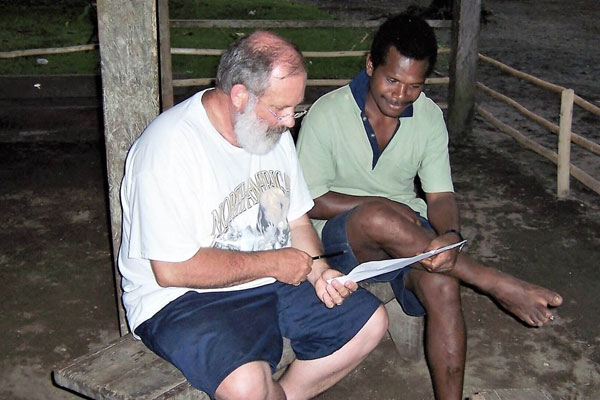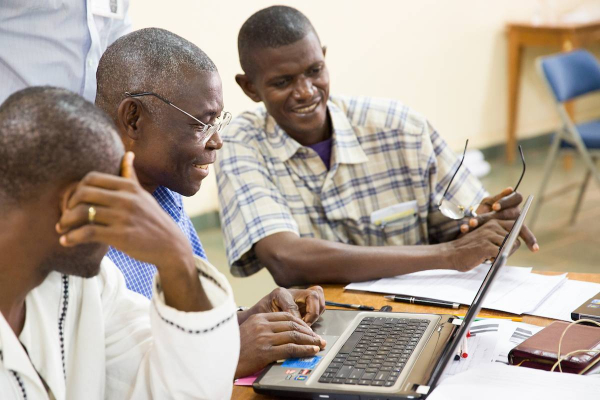5 Tips for Thriving as a Long-Term Remote Worker

As the world shifted in a rush last year to remote work, many of us were thrilled at the possibilities: no commute time, less distractions (unless your kids were home too) and the ability to access opportunities and education that were not locally available. We could adjust our schedules to be more efficient or care for others. Plus a trip to the kitchen snack cabinet only took seconds!
But remote work isn’t without its challenges. If you’re settling into remote work for the foreseeable future, you may need to make some adjustments in order to thrive.
Even before COVID-19, Wycliffe Bible Translators was already committed to remote work options both for U.S. and overseas roles. In fact, in some parts of the world where outside personnel are not allowed, remote translation projects and support systems are key to serving language groups still waiting for God’s Word. Here are five tips we’ve learned over the years to help you flourish in a remote work setting.
1. Find Your Identity in Christ
Without coworkers stopping by your office and other inter-office distractions, it may be easy to get caught up in all the work you have to do. You might even struggle with building in margin or creating boundaries so that work doesn’t spill over into your personal time. But Lloyd Milligan, who’s served with Wycliffe for over 40 years, argues that is not where your focus should land.

“Find your satisfaction in your relationship with God, not in what you do for God,” Lloyd said.
Lloyd recently returned to his original position as a translation adviser for the Mangseng language in Papua New Guinea. Due to COVID-19 and his own family needs, Lloyd now advises the Mangseng translation team remotely, using computer programs like Paratext and WhatsApp.
“Don’t find your self-worth in what you do,” he observed. “Instead put significant time in developing your walk with Jesus and get your self-worth from who he says you are in Christ.”
2. Be Intentional
When COVID-19 hit and many people were hauling their laptops home and having meetings on their couch, work patterns were more about surviving rather than thriving.
But sustained, healthy remote work requires intentional patterns. John Madden, the associate director for mobilization in Wycliffe USA, has worked remotely for over 10 years and understands the challenges.

“Make your workspace your own: as functional as possible while also as enjoyable as possible,” he advised. “That might mean the right lighting, paint, windows or even birdhouses outside your window. It sounds silly but I really find that to be helpful … when you spend 8-9 hours in your office all day.” Lloyd Milligan discovered that windchimes out his window gave him joy.
Creating healthy patterns is also important when you don’t have to leave your desk for meetings or to chat in the cafeteria. “Take the time to be out of your office during your work hours,” John said. “Have lunch at the kitchen table or out on the porch, not in your work area. … Don’t make your whole day centered around your office.”
Although prayer is always a priority, translation adviser Emma Heine finds she must be even more intentional about making it a regular rhythm in her work: “Remote work shows us how much we must depend on God and prayer,” she shared “When you’re not physically there … you just have to pray and trust God will do it.”
3. Think Outside of the Box
Trying to replicate office work in a remote work situation is not just challenging but can even be detrimental. Consider out-of-the-box ways to accomplish the same goals through different paths. That might mean working around your most energetic or creative times or working in the same time zones as your colleagues.
Emma Heine, a translation adviser, was forced to consider remote work when her health prevented her from living near the language group anymore. Since returning to the U.S., she’s had to be quite flexible and creative in order to address time zones, internet connectivity, security issues and technical problems with her remote team. “We use audio messages, screenshots, some video calls and Paratext, a translation software,” Emma explained. “It’s exciting we can do this!”
Being separated from the language community has its challenges, so Emma’s team of local translators are committed to helping her stay connected through short videos of their everyday life. “I talk to them every day,” Emma shared. “I’ve even met one translator’s mother and toured her house over video call. I hadn’t been able to do that before. When one girl was in the hospital, they put me on video and I was able to pray for her in the hospital room with everyone else there. That wouldn’t have happened if I was in person.”
4. Develop an External Support System
When you work for a ministry or missions organization like Wycliffe, it’s easy to think that all of your ministry outlets should be related to your job. But that’s not always the best choice, especially for remote workers.
“Make sure you have an external support system in place,” John Madden commented, “because it can get very lonely at times. Get involved in a local ministry [like one] at your church or the Perspectives on the World Christian Movement course.”
Lloyd Milligan agreed: “Find a spiritual buddy,” he emphasized. “I’ve been meeting online with a Wycliffe colleague for 12 years now. We meet every week for an hour and a half. We read books and Scripture together and discuss them. It's the most radically beneficial spiritual practice I’ve ever put into my life.”
Emma Heine has intentionally built a support system by joining a group of retired missionary women who get together monthly to pray for each other. “I also found a local church that is home to a minority ethnic group from the same country where my team is,” she shared.
5. Get Involved
Remote workers often feel disconnected and suffer from a lack of community with their organization and colleagues. Over the years of supporting remote teams, Wycliffe has found it’s crucial to enable remote staff to participate in events, join conferences, attend Scripture dedications and other celebrations, and serve in ways outside their normal job. This helps everyone strengthen their community and sense of belonging. Although COVID-19 has changed how we conduct in-person interactions, we have continued to be intentional about creating safe ways for our staff to deepen those connections.
As a team manager, John Madden takes this very seriously. “Remote work forces you to take more initiative instead of being passive,” John said. “You have to be actively engaged in what you’re doing … and you have to be creative in how you lead a team.”
John continued: “In addition to our regular operational meetings, I’ve increased our team development so we meet regularly for common activities such as a book study, devotions and just time to pray with each other. I am trying to build that team bond even from afar so that morale is not just sustained but increased.”
Set yourself up for success in long-term remote working situations by practicing these five tips. Through finding your identity in Christ, thinking outside the box, developing an external support system and getting involved, remote working will become more satisfying and enable you to thrive.
To learn more about remote work options with Wycliffe, contact us at [email protected]!






